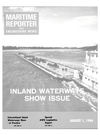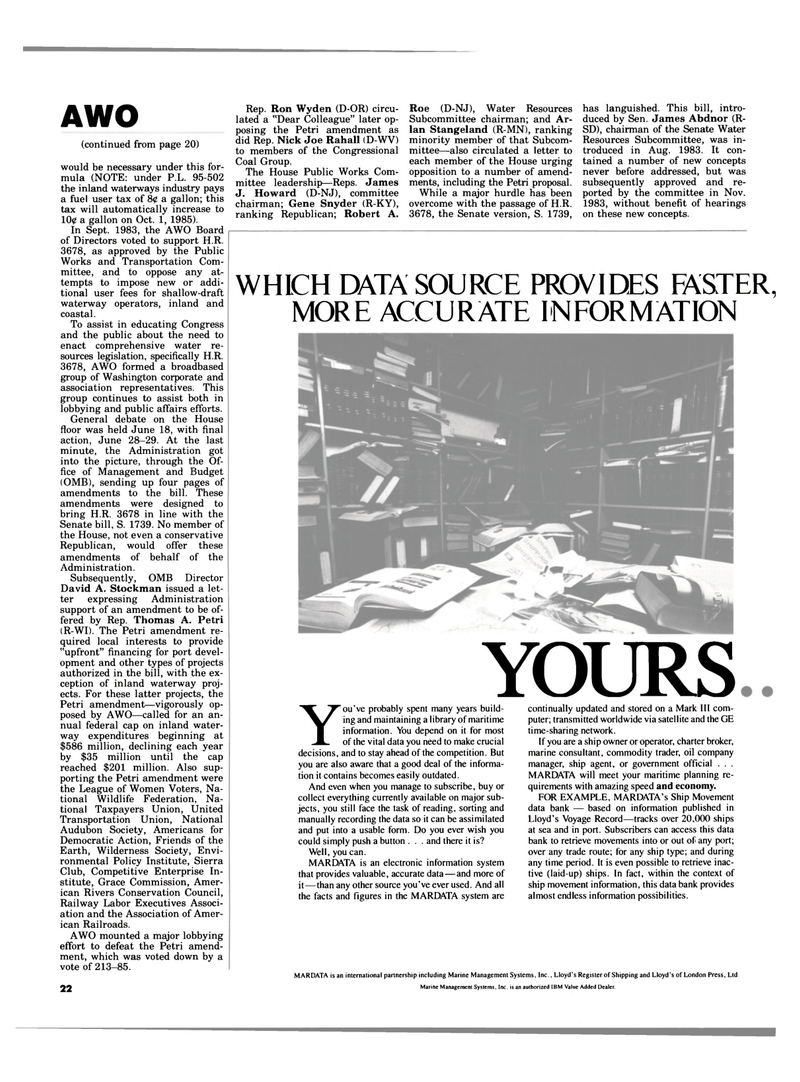
Page 20: of Maritime Reporter Magazine (August 1984)
Read this page in Pdf, Flash or Html5 edition of August 1984 Maritime Reporter Magazine
AWO
(continued from page 20)
would be necessary under this for-
mula (NOTE: under P.L. 95-502
the inland waterways industry pays
a fuel user tax of 8 In Sept. 1983, the AWO Board
of Directors voted to support H.R.
3678, as approved by the Public
Works and Transportation Com-
mittee, and to oppose any at-
tempts to impose new or addi-
tional user fees for shallow-draft
waterway operators, inland and
coastal.
To assist in educating Congress
and the public about the need to
enact comprehensive water re-
sources legislation, specifically H.R.
3678, AWO formed a broadbased
group of Washington corporate and
association representatives. This
group continues to assist both in
lobbying and public affairs efforts.
General debate on the House
floor was held June 18, with final
action, June 28—29. At the last
minute, the Administration got
into the picture, through the Of-
fice of Management and Budget
(OMB), sending up four pages of
amendments to the bill. These
amendments were designed to
bring H.R. 3678 in line with the
Senate bill, S. 1739. No member of
the House, not even a conservative
Republican, would offer these
amendments of behalf of the
Administration.
Subsequently, OMB Director
David A. Stockman issued a let-
ter expressing Administration
support of an amendment to be of-
fered by Rep. Thomas A. Petri
(R-WI). The Petri amendment re-
quired local interests to provide
"upfront" financing for port devel-
opment and other types of projects
authorized in the bill, with the ex-
ception of inland waterway proj-
ects. For these latter projects, the
Petri amendment—vigorously op-
posed by AWO—called for an an-
nual federal cap on inland water-
way expenditures beginning at
$586 million, declining each year
by $35 million until the cap
reached $201 million. Also sup-
porting the Petri amendment were
the League of Women Voters, Na-
tional Wildlife Federation, Na-
tional Taxpayers Union, United
Transportation Union, National
Audubon Society, Americans for
Democratic Action, Friends of the
Earth, Wilderness Society, Envi-
ronmental Policy Institute, Sierra
Club, Competitive Enterprise In-
stitute, Grace Commission, Amer-
ican Rivers Conservation Council,
Railway Labor Executives Associ-
ation and the Association of Amer-
ican Railroads.
AWO mounted a major lobbying
effort to defeat the Petri amend-
ment, which was voted down by a
vote of 213-85.
22
Rep. Ron Wyden (D-OR) circu-
lated a "Dear Colleague" later op-
posing the Petri amendment as
did Rep. Nick Joe Rahall (D-WV)
to members of the Congressional
Coal Group.
The House Public Works Com-
mittee leadership—Reps. James
J. Howard (D-NJ), committee
chairman; Gene Snyder (R-KY),
ranking Republican; Robert A.
Roe (D-NJ), Water Resources
Subcommittee chairman; and Ar-
lan Stangeland (R-MN), ranking
minority member of that Subcom-
mittee—also circulated a letter to
each member of the House urging
opposition to a number of amend-
ments, including the Petri proposal.
While a major hurdle has been
overcome with the passage of H.R.
3678, the Senate version, S. 1739,
has languished. This bill, intro-
duced by Sen. James Abdnor (R-
SD), chairman of the Senate Water
Resources Subcommittee, was in-
troduced in Aug. 1983. It con-
tained a number of new concepts
never before addressed, but was
subsequently approved and re-
ported by the committee in Nov.
1983, without benefit of hearings
on these new concepts.
WHICH DATA SOURCE PROVIDES FASTER,
MORE ACCURATE INFORMATION
YOURS Y
ou've probably spent many years build-
ing and maintaining a library of maritime
information. You depend on it for most
of the vital data you need to make crucial
decisions, and to stay ahead of the competition. But
you are also aware that a good deal of the informa-
tion it contains becomes easily outdated.
And even when you manage to subscribe, buy or
collect everything currently available on major sub-
jects, you still face the task of reading, sorting and
manually recording the data so it can be assimilated
and put into a usable form. Do you ever wish you
could simply push a button . . . and there it is?
Well, you can.
MARDATA is an electronic information system
that provides valuable, accurate data—and more of
it—than any other source you've ever used. And all
the facts and figures in the MARDATA system are
continually updated and stored on a Mark III com-
puter; transmitted worldwide via satellite and the GE
time-sharing network.
If you are a ship owner or operator, charter broker,
marine consultant, commodity trader, oil company
manager, ship agent, or government official . . .
MARDATA will meet your maritime planning re-
quirements with amazing speed and economy.
FOR EXAMPLE, MARDATA's Ship Movement
data bank — based on information published in
Lloyd's Voyage Record—tracks over 20,000 ships
at sea and in port. Subscribers can access this data
bank to retrieve movements into or out of any port;
over any trade route; for any ship type; and during
any time period. It is even possible to retrieve inac-
tive (laid-up) ships. In fact, within the context of
ship movement information, this data bank provides
almost endless information possibilities.
MARDATA is an international partnership including Marine Management Systems. Inc., Lloyd's Register of Shipping and Lloyd's of London Press. Ltd
Marine Management Systems, Inc. is ail authorized IBM Value Added Dealer.

 19
19

 21
21
